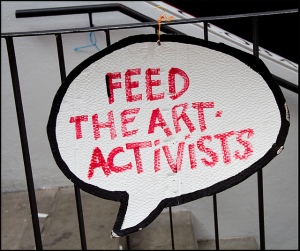Together with my colleague Pablo Abend, I have presented parts of our research on “Occupy and Academia” during the workshop Protest Culture/Cultural Protest. We discussed interdependencies between protest and resistance practices of the Occupy movement(s) and academic research in related fields. The workshop took place at the Collegium Polonicum in Słubice from November 15 to 16, 2013. It was organized in cooperation with the Department of Comparative Social and Cultural Anthropology at the European University Viadrina in Frankfurt/Oder. This is a short version of what we have been talking about:
During the rise of the Occupy movement and its offshoots in various countries from late 2011 to 2012, it was soon evident that academics of diverse disciplines played a decisive role within the configuration and establishment of its protest culture/s. The movement was identified as a fascinating, fruitful and prestigious object of academic analyses: particular empirical and ethnographic approaches were employed in order to instruct academic access to the phenomenon. For a while, it seemed like the Occupy movement had created unforeseen public platforms and possibilities for significant political changes. Meanwhile, the protests have ceased and academic, journalistic and public attention has turned to other events. Activists and observers were left speculating about the reasons for the end of a protest movement which appeared to be very powerful in its beginnings. This paper sets out to investigate whether and to what extent academia has to take over some responsibility for the movement’s initial creativity and effective visibility, but also for Occupy’s decline.
The paper will investigate the argument that Occupy’s kick-off has been accompanied by a keen interest on the part of academics to get involved in the protest movement: their involvement has helped to provide the movement with a certain discursive agency and active support. However, since most academics’ interests were not mainly founded on activist and political concerns, their involvement began to decline once their academic needs were satisfied and the necessary material was acquired. In a recent article for example, Thomas Frank comments on academics’ short-term activism: “OWS was taken as a proving ground for theory. Its ranks weren’t just filled with professionals and professionals-to-be; far too often the campaign itself appeared to be an arena for professional credentialing”.
This paper is therefore concerned with intra– and inter-personal negotiation processes and conflicts between the roles of activists and academics. It will discuss the implications resulting from the double-role of academics as short-term activists in a political setting. We propose that Occupy as well as other political contexts might require a rethinking of the responsibilities and implications of qualitative, empirical research in such ‘fields’. In order to do so, we propose to conceptualise the Occupy protests not as ‘fields of research’, but rather as socio-political laboratories which have produced experimental aesthetics and political as well as artistic practices. From this perspective, it has been a misconception to understand the spatial settings of Occupy as ‘fields’—which has also led to methodological issues.

The reflections of most researchers were informed by ethnographic and anthropological approaches, and therefore the sites of cultural protest were treated as fields of investigation. In our contribution, we propose that instead of ‘fields’ we should model the spaces of protest as ‘laboratories’ expressing experimental aesthetics: we will argue that occupied public places can be characterized as socio-political laboratories where the social is experimentally re-negotiated. In this sense, exhibitions such as the ‘Occupy Biennale’ (Berlin, 2012) have merely reproduced a setting which has been artistic and experimental in itself rather than producing new artistic value. A ‘laboratorization’ of the field is affected from two directions. Firstly, one could observe a ‘laboratorization bottom-up’: the actors of Occupy themselves conceptualized their practices as experiments. They were re-appropriating public places in order to establish fluid, alternative cultures of protest, communication and living. Secondly, within these already experimental settings, researchers employed a ‘laboratorization top-down’: they were partly actively involved, and arranged the settings according to their individual research interests. This involved cases where particular political goals and discourses were enforced, experimental situations created or occasions for communication created.
The paper will draw upon methodological and epistemological insights from Science and Technology Studies. With a particular focus on early laboratory studies (e.g. Knorr Cetina 1984, 1998; Latour 2006; Latour/Woolgar 1986)[3], these insights shall be applied in order to analyse the particular quality of knowledge and aesthetics produced within the Occupy protests. These findings lead to several methodological implications for future investigations in social uprisings: if the field can be described in terms of the laboratory (which is prepared and closed by the practices of the activists), then research activities based on participatory observations seem to be partly inadequate to the situation, or at least demand further reflections on the epistemological quality of those socio-political laboratories which have been rendered as ‘fields’ so far.